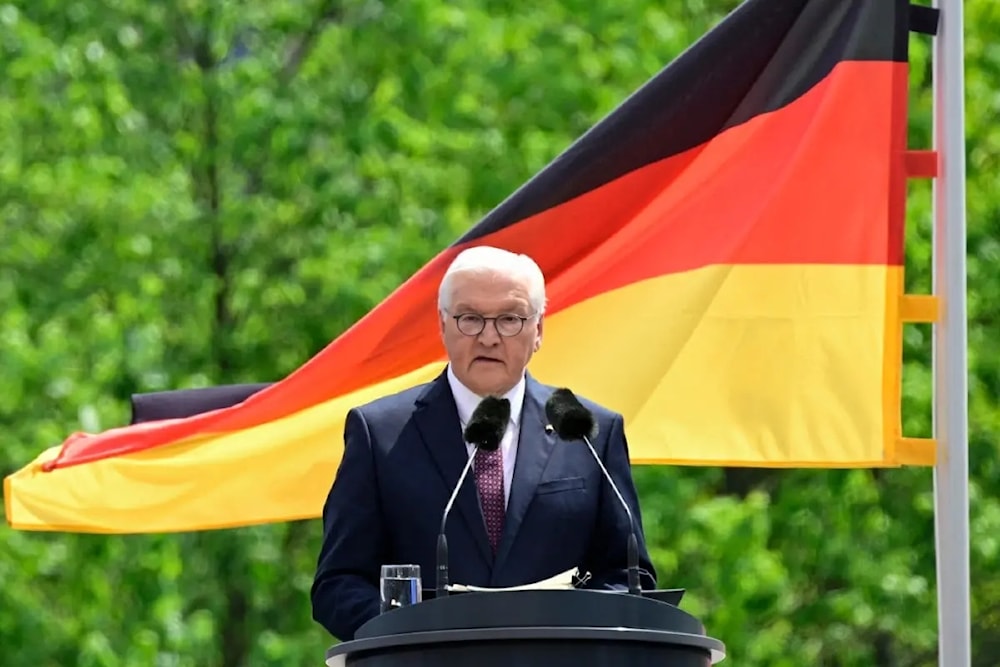German President poised to approve early elections
Germany has entered a period of political uncertainty following the collapse of its fragile three-party ruling coalition.
-

German President Frank-Walter Steinmeier delivers a speech during the state ceremony as part of celebrations to mark 75 years of the German Constitution in front of the Chancellery in Berlin, Germany on May 23, 2024. (AFP)
German President Frank-Walter Steinmeier announced on Thursday that he is prepared to call an early parliamentary election when necessary, following the collapse of the nation's ruling coalition.
Steinmeier has officially dismissed three federal ministers: Finance Minister Christian Lindner, who was removed by Chancellor Olaf Scholz late Wednesday, along with Justice Minister Marco Buschmann and Education Minister Bettina Stark-Watzinger. All three were members of the pro-business Free Democratic Party (FDP).
The FDP, one of the three parties in the coalition with Scholz's Social Democrats and the Greens, withdrew from the government in response to Lindner's dismissal, leaving Scholz with a minority government consisting only of his party and the Greens.
The big picture
In light of the coalition's dissolution, Scholz announced plans to seek a vote of confidence in mid-January. If the government loses the vote, early elections could be held in March 2025. Regular parliamentary elections are currently scheduled for September.
Steinmeier remarked, on Thursday, that the recent political events were “something that has rarely happened” in modern Germany's 75-year history. He acknowledged that if the parliament expressed a lack of confidence in the government, he would need to “decide on the dissolution” of the legislative body, declaring, “I stand ready for this decision.”
He noted that dissolving parliament early comes with constitutional requirements, emphasizing that "our country needs a stable majority and a government that is capable of acting," which would be his sole criterion when making the decision. He urged for “reason and responsibility,” calling on political leaders to rise to the challenges ahead.
Media reports from Wednesday suggested that Finance Minister Christian Lindner was dismissed after reportedly proposing early elections due to the coalition's inability to agree on how to address a multibillion-euro deficit in the upcoming budget. The coalition members had been at odds over economic policy for months.
On Thursday, Chancellor Olaf Scholz indicated that a major sticking point was Ukraine aid. He shared that he had presented a four-point plan, including “increasing our support for Ukraine,” which Lindner opposed.
Dive deeper
The FDP, the smallest party in the coalition, had long been at odds with the SPD and Greens on various issues, particularly over the budget and efforts to revitalize the struggling German economy. Lindner had frequently hinted at leaving the troubled coalition and had warned of "an autumn of decisions" as a key deadline for fiscal negotiations approached.
Last week, German media leaked a paper created by Lindner, which included a list of economic recovery recommendations. These efforts, however, contradict the SPD and Greens' agendas. According to Bild, Scholz called an emergency SPD conference late Sunday to establish the party's approach for negotiations with coalition partners.
The collapse of the coalition drew sharp criticism from Friedrich Merz, leader of the opposition CDU-CSU alliance, who has long called for early elections. CDU lawmaker Norbert Roettgen said, "We cannot afford to argue for another year," after Trump’s victory and just before the coalition's breakdown.
Read next: EU elections see far-right advance in key France, Germany

 3 Min Read
3 Min Read








